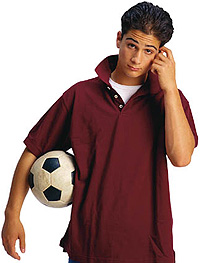Your child is perfectly polite to teachers and adults, but how is he or she on the playing field? If name-calling, trash talking or cheating is part of his or her game plan, it may be time to talk about good sportsmanship.
 To help you bench your child’s bad behavior, Kids Today talked to Russell Hoffmann, PhD, director of psychology at St. Louis Children’s Hospital, and Robert Spewak, MD, pediatrician on staff at St. Louis Children’s Hospital.
To help you bench your child’s bad behavior, Kids Today talked to Russell Hoffmann, PhD, director of psychology at St. Louis Children’s Hospital, and Robert Spewak, MD, pediatrician on staff at St. Louis Children’s Hospital.
Driven by Success
Understanding the underlying cause of your child’s behavior is key to helping him or her overcome it. All too often the name of the game is victory -- winning becomes the most important aspect to children (or their parents), and the pressure may lead to bad sportsmanship. While you may think forcing your child to practice every weekend or yelling encouragement from the stands is helping, it may be doing more harm than good.
“Be a good role model and make it clear that success for you is not solely defined by a score, but by a person’s conduct and character,” says Dr. Hoffmann. “If parents put too much pressure on their children to succeed, neither parent nor child will be prepared for failure. Make a point of rewarding your child for good sportsmanship, such as not cheating and being a good loser. That way, no matter the outcome of the game, your child can be proud of his or her performance.”
Parents also need to make sure their child knows what is important about participating in an athletic activity. “It’s not whether you win or lose. What matters is the skills you learn, the health benefits and ultimately, how you play the game,” explains Dr. Spewak. “It should also be fun for the child.”
Lend a Listening Ear
If your child expresses a desire to quit an athletic activity, talk about it. It may be that he or she felt pressured to take on your favorite sport -- baseball -- but would rather play soccer.
“When a child is playing a sport that he or she doesn’t like or didn’t choose, it creates undue pressure,” says Dr. Spewak. “It also gives the child the impression that what the parent wants is more important. Parents need to be attuned to their child’s interests, whether it’s playing a team sport or joining the chess club.”
“As a parent you can help your child achieve his or her personal best. Work with your child to establish individual goals to evaluate himself or herself,” says Dr. Hoffmann. “Emphasize good sportsmanship and minimize the focus on the win-loss record.”










